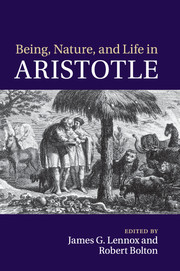Book contents
- Frontmatter
- Contents
- Preface
- Notes on contributors
- Acknowledgments
- Allan Gotthelf: a biographical sketch
- Note on abbreviations
- Introduction
- 1 Teleology, Aristotelian and Platonic
- 2 Biology and metaphysics in Aristotle
- 3 The unity and purpose of On the Parts of Animals 1
- 4 An Aristotelian puzzle about definition: Metaphysics Ζ.12
- 5 Unity of definition in Metaphysics Η.6 and Ζ.12
- 6 Definition in Aristotle's Posterior Analytics
- 7 Male and female in Aristotle's Generation of Animals
- 8 Metaphysics Θ.7 and 8: Some issues concerning actuality and potentiality
- 9 Where is the activity?
- 10 Political community and the highest good
- Allan Gotthelf's contributions to classical philosophy
- References
- Index locorum
- General index
5 - Unity of definition in Metaphysics Η.6 and Ζ.12
Published online by Cambridge University Press: 06 December 2010
- Frontmatter
- Contents
- Preface
- Notes on contributors
- Acknowledgments
- Allan Gotthelf: a biographical sketch
- Note on abbreviations
- Introduction
- 1 Teleology, Aristotelian and Platonic
- 2 Biology and metaphysics in Aristotle
- 3 The unity and purpose of On the Parts of Animals 1
- 4 An Aristotelian puzzle about definition: Metaphysics Ζ.12
- 5 Unity of definition in Metaphysics Η.6 and Ζ.12
- 6 Definition in Aristotle's Posterior Analytics
- 7 Male and female in Aristotle's Generation of Animals
- 8 Metaphysics Θ.7 and 8: Some issues concerning actuality and potentiality
- 9 Where is the activity?
- 10 Political community and the highest good
- Allan Gotthelf's contributions to classical philosophy
- References
- Index locorum
- General index
Summary
In Metaphysics Η.6 Aristotle asks: “What unifies a definition, making its parts into a whole and not a mere list?” A definition is a single account, he says, not by being tied together like the Iliad (the whole poem in twenty-four books), but by being of one thing. Although a definition is a complex formula, consisting of a number of linguistic parts, it is one if the object defined is one. So the unity of definition is parasitic on the unity of the object defined. Aristotle is looking for basic entities, whose being is fully determined by their essence and not by other entities which claim priority. These basic entities ground our understanding of other things. What, then, makes an object one, whose account is a definition? Aristotle discusses three sorts of examples: substantial forms, material composites, and categorial properties.
Start with a determinate form such as man. What makes man one? Suppose we define man as “biped animal”: why is man one thing and not an aggregate of two things, animal and biped, which are distinct from each other and logically prior to it – that is, mentioned in its definition? The question threatens the Platonists, who regard animal and biped as separate forms. Aristotle poses the problem thus:
Why is man not those [animal and biped], and men will exist by participation, not in one thing, man, but in two things, animal and biped, and so in general, man would not be one but more than one, animal and biped?[…]
Keywords
- Type
- Chapter
- Information
- Being, Nature, and Life in AristotleEssays in Honor of Allan Gotthelf, pp. 97 - 121Publisher: Cambridge University PressPrint publication year: 2010
- 12
- Cited by



